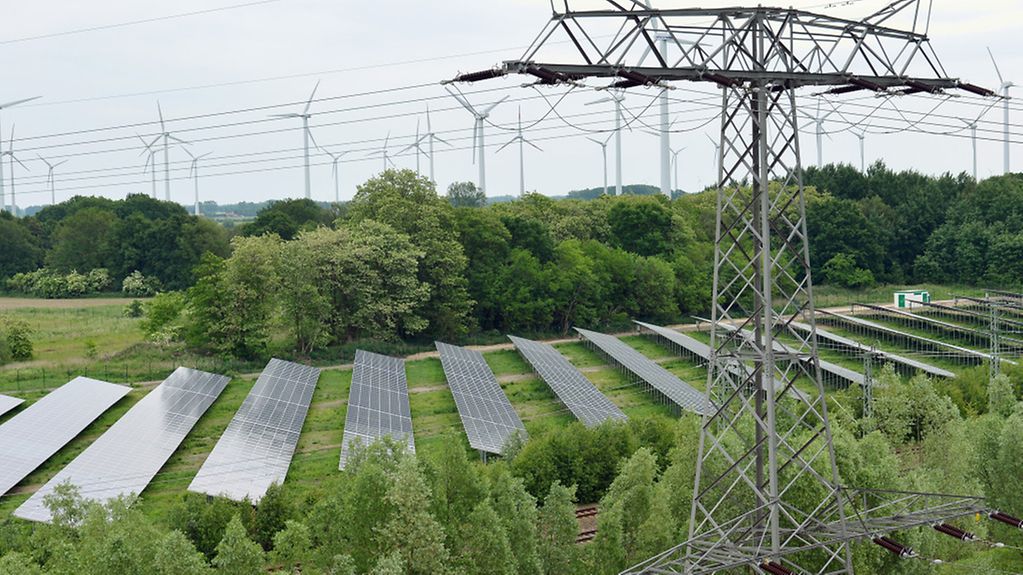Climate Action Plan 2050
The German government has adopted a national Climate Action Plan. By 2050 practically no more coal is to be used to generate power. New buildings are no longer to depend on fossil fuels for heating and hot water. The transport sector is to shift to the use of alternative fuels.
4 min reading time

The focus is on the future of the power generation, agriculture, industry, transport and building sectors
Photo: picture alliance / ZB
The Climate Action Plan 2050 offers essential guidance for all actors in the private sector, the science and research community, and civil society. By 2030, Germany is to reduce its emissions of greenhouse gases by at least 55 per cent as compared to the 1990 level. By 2040 a reduction of at least 70 per cent is to be achieved. Germany thus remains a trailblazer in terms of translating into practice the commitments entered into in the Paris Agreement.
On the way to a greenhouse gas neutral society
To put it plainly, this will mean that Germany will only invest in fossil fuels and pertinent processing in exceptional cases. This would apply, for instance, where no technological and affordable alternative exists. Buildings are to be better insulated and gas- and oil-fired heating systems replaced. Currently passenger and goods transport, by rail, road, air and water, is dependent on fossil fuels. A shift to alternative fuels is needed here and new engine technologies must be developed.
By 2050 power generation is to be almost entirely coal-free, meaning that it will have to be based on renewable energy. As the country moves away from the use of coal, however, alternative jobs are to be created in the affected regions to ensure that the people there are given new prospects.
Building modernisation must remain affordable. New buildings are to be better insulated and are no longer to depend on fossil fuels for heating and hot water. To tangibly reduce emissions of greenhouse gases in the transport sector, new engine technology will have to be developed, and local public transport systems and rail transport further developed.
The Cabinet has now approved the Climate Action Plan 2050 in a written resolution process. Generally, Cabinet resolutions are passed at meetings of the entire Cabinet in line with the provisions of article 20, paragraph 1 of the joint rules of procedure of the German federal government (GOBReg - Gemeinsame Geschäftsordnung der Bundesregierung). Under exceptional circumstances, however, all Cabinet ministers can approve a motion in writing, pursuant to article 20, paragraph 2 of the joint rules of procedure, if the resolution cannot be discussed at the next Cabinet meeting (because of the urgent nature of the resolution, for instance).
Pointing the way forward
The government’s Climate Action Plan 2050 points the way forward for a radical turn-around in industry and society alike. It focuses on the future of the power generation, agriculture, industry, transport and building sectors. In all these sectors, fossil fuels are increasingly to be replaced by renewable energy. Renewables and energy efficiency will be the new gold standard for investment.
To achieve this structural transition, innovative and efficient technologies will have to be further developed and applied. The Climate Action Plan 2050 lays out the fields of action and the overarching goals for modernising Germany.
We have major technological developments before us, says Barbara Hendricks
"I am calmly confident that we will manage to put our economy on a largely greenhouse gas neutral footing by 2050," commented Federal Environment Minister Barbara Hendricks. "This is absolutely feasible, even with the compromises we have now agreed. I believe that we have major technological developments before us that we do not yet even know," she added.
"There is a consensus within the German government that we need a plan of this sort and that we are committed to achieving the climate action targets we have now agreed on," said Chancellor Angela Merkel on 2 November in Berlin.
In December 2015 in Paris almost 200 nations agreed on a binding global climate agreement to ensure that average temperature rise is kept "well below 2° Celsius in comparison to the pre-industrial era". The target is in fact to keep global warming down to 1.5° Celsius.
Climate friendliness is the overarching goal
The scene must be set today for a greenhouse gas neutral future. A preventive strategy like this makes more sense than facing the costs of having to respond to climate change. But a radical rethinking is needed along with coordinated action. Climate friendliness means that every measure must be reviewed to ascertain that it is sustainable, environmentally and economically viable, and socially acceptable.
The Climate Action Plan incorporates new findings and developments. Because it must be reviewed once every five years, the measures taken and goals achieved will be monitored at regular intervals and constantly improved.
From 7 to 18 November the international community is meeting in Morocco to discuss the implementation of the climate targets laid out in the Paris Agreement. The new Climate Action Plan means that Germany retains its role as an international trailblazer in terms of implementing the Paris Agreement.